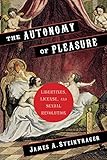The Autonomy of Pleasure : Libertines, License, and Sexual Revolution / James Steintrager.
Material type: TextSeries: Columbia Themes in Philosophy, Social Criticism, and the ArtsPublisher: New York, NY : Columbia University Press, [2016]Copyright date: ©2016Description: 1 online resource (408 p.) : 40 illustrationsContent type:
TextSeries: Columbia Themes in Philosophy, Social Criticism, and the ArtsPublisher: New York, NY : Columbia University Press, [2016]Copyright date: ©2016Description: 1 online resource (408 p.) : 40 illustrationsContent type: - 9780231151580
- 9780231540872
- 306.7094409/033 23
- HQ18.F8 S74 2016
- HQ18.F8 S74 2016
- online - DeGruyter
- Issued also in print.
| Item type | Current library | Call number | URL | Status | Notes | Barcode | |
|---|---|---|---|---|---|---|---|
 eBook
eBook
|
Biblioteca "Angelicum" Pont. Univ. S.Tommaso d'Aquino Nuvola online | online - DeGruyter (Browse shelf(Opens below)) | Online access | Not for loan (Accesso limitato) | Accesso per gli utenti autorizzati / Access for authorized users | (dgr)9780231540872 |
Browsing Biblioteca "Angelicum" Pont. Univ. S.Tommaso d'Aquino shelves, Shelving location: Nuvola online Close shelf browser (Hides shelf browser)

|

|

|

|

|

|

|
||
| online - DeGruyter We Need Silence to Find Out What We Think : Selected Essays / | online - DeGruyter Columbia Business School : A Century of Ideas / | online - DeGruyter Investment: A History / | online - DeGruyter The Autonomy of Pleasure : Libertines, License, and Sexual Revolution / | online - DeGruyter Sacred Knowledge : Psychedelics and Religious Experiences / | online - DeGruyter Kosher USA : How Coke Became Kosher and Other Tales of Modern Food / | online - DeGruyter Industry and Intelligence : Contemporary Art Since 1820 / |
Frontmatter -- Contents -- Acknowledgments -- Introduction: Whose Sexual Revolution? -- Chapter one. A Thousand Modes of Venery: Coital Positions as Actions and Communications -- Chapter two. Voluptuary Architecture: Organizing, Policing, and Producing Pleasure -- Chapter three. Sodomy and Reason: Making Sense of the Libertine Preference -- Chapter four. "the obscene organ of brute pleasure": Social Functions of the Clitoris -- Chapter five. The Fury of Her Kindness: What Should a Libertine Know About Orgasm? -- Chapter six. Color and Caprice: The Politics and Aesthetics of Interracial Relations -- Chapter seven. Canonizing Sade: Eros, Democracy, and Differentiation -- Notes -- Index
restricted access online access with authorization star
http://purl.org/coar/access_right/c_16ec
What would happen if pleasure were made the organizing principle for social relations and sexual pleasure ruled over all? Radical French libertines experimented clandestinely with this idea during the Enlightenment. In explicit novels, dialogues, poems, and engravings, they wrenched pleasure free from religion and morality, from politics, aesthetics, anatomy, and finally reason itself, and imagined how such a world would be desirable, legitimate, rapturous-and potentially horrific.Laying out the logic and willful illogic of radical libertinage, this book ties the Enlightenment engagement with sexual license to the expansion of print, empiricism, the revival of skepticism, the fashionable arts and lifestyles of the Ancien Régime, and the rise and decline of absolutism. It examines the consequences of imagining sexual pleasure as sovereign power and a law unto itself across a range of topics, including sodomy, the science of sexual difference, political philosophy, aesthetics, and race. It also analyzes the roots of radical claims for pleasure in earlier licentious satire and their echoes in appeals for sexual liberation in the 1960s and beyond.
Issued also in print.
Mode of access: Internet via World Wide Web.
In English.
Description based on online resource; title from PDF title page (publisher's Web site, viewed 02. Mrz 2022)


